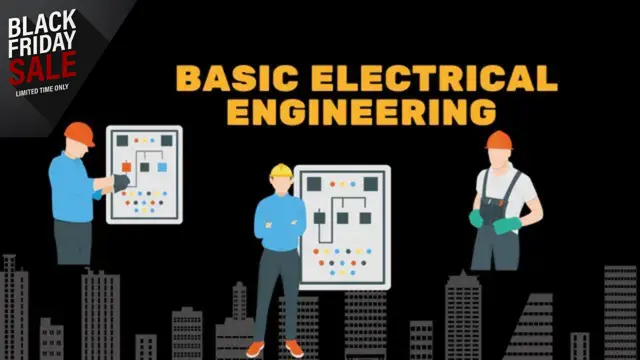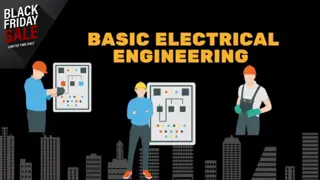
Electrical Engineering - Portable Appliance Testing
CPD Certified| Free PDF Certificate | Lifetime Access | Learner Support | No Hidden Fees | 100% Success Rate
EDURISE
Summary
- Certificate of completion - Free
- Reed Courses Certificate of Completion - Free
- Tutor is available to students
Add to basket or enquire
Overview
Unlock the Power of Electrical Engineering: Propel Your Expertise Forward
Are you ready to dive into the dynamic world of Electrical Engineering? Prepare to embark on a journey that opens doors to endless opportunities in this thriving field.
Why Electrical Engineering Matters:
In today's tech-driven world, electrical engineering is at the heart of innovation. It's the driving force behind the gadgets we use, the power systems that light our cities, and the automation that streamlines industries.
Data-Driven Insights:
The demand for electrical engineers is surging, with a steady increase in job openings across various sectors. Businesses seek skilled professionals who can design, troubleshoot, and optimize electrical systems.
The Business of Electrical Engineering:
Electricity is the lifeblood of modern businesses, and skilled electrical engineers are the architects of this power. Whether you're employed in manufacturing, energy, telecommunications, or any other sector, your expertise will be indispensable.
Empower Your Career:
Electrical engineering isn't just a job; it's a journey filled with constant learning and innovation. By mastering this field, you position yourself as a valuable asset to any organization. Your ability to solve complex problems, design efficient systems, and harness cutting-edge technology will set you apart.
Who Should Enroll:
Aspiring Electrical Engineers: Individuals eager to break into the field and gain foundational knowledge.
Engineers Seeking Advancement: Those looking to expand their skill set and stay current with industry trends.
Tech Enthusiasts: Anyone passionate about the world of electronics and electricity.
Course Highlights:
Module 1: Fundamentals of Electrical Engineering: Build a solid foundation by understanding the core principles and theories.
Module 2: Electrical Circuit Design: Learn to design and analyze circuits, from basic to advanced configurations.
Module 3: Power Systems: Dive into the world of power generation, distribution, and management.
Module 4: Electronics and Digital Systems: Explore the intricacies of electronic components and digital circuitry.
Module 5: Control Systems: Master control theory and applications for automation and robotics.
Module 6: Renewable Energy: Discover sustainable solutions for the future with a focus on renewable energy sources.
Join Us Today:
Don't miss out on this opportunity to harness the power of Electrical Engineering. Whether you're just starting or seeking to advance your career, our comprehensive course will equip you with the knowledge and skills needed to thrive in this dynamic industry.
Enroll now and become a key player in shaping the electrified world of tomorrow. Your journey to electrical engineering excellence starts here!
Free Gift with Basic Electrical Engineering
- Basic Electrical Engineering Course Completion PDF Certificate
- Tutor Support
- Yearly Free Webinar on Basic Electrical Engineering
Curriculum
Course media
Description
Learning Outcomes:
1. Mastery of Electrical Fundamentals: Develop a solid understanding of the fundamental concepts and principles that underpin electrical engineering, providing a strong foundation for more advanced topics.
2. Proficiency in DC Network Analysis: Gain the expertise to analyze and design direct current (DC) networks, applying network theorems to solve complex problems.
3. Competence in Single-Phase AC Circuits: Acquire the skills needed to analyze and work with single-phase alternating current (AC) circuits, including circuit analysis and power calculations.
4. Expertise in Digital Electronics: Explore the world of digital electronics, delving into logic gates, flip-flops, and digital circuit design, setting the stage for digital systems development.
5. Application of Theoretical Knowledge: Learn how to apply theoretical knowledge to practical scenarios, ensuring that you can translate your understanding into real-world applications.
Module 1: Fundamentals of Electricity
This module lays the groundwork for your journey into electrical engineering. You'll explore the basics of electricity, covering concepts like voltage, current, resistance, and electrical circuits. By the end of this module, you'll have a solid grasp of the essential principles that govern electrical systems.
Module 2: DC Networks and Network Theorems
In this module, you'll dive deeper into electrical circuits, focusing on direct current (DC) networks. You'll learn about key network theorems such as Ohm's Law and Kirchhoff's Laws, enabling you to analyze and design complex DC circuits with confidence.
Module 3: Single Phase AC Circuits
Building on your DC knowledge, this module introduces you to single-phase alternating current (AC) circuits. You'll explore AC waveforms, impedance, and power calculations. By the end of this module, you'll be well-versed in working with single-phase AC circuits, a crucial skill for electrical engineers.
Module 4: Digital Electronics
This module explores the exciting world of digital electronics. You'll delve into logic gates, binary systems, flip-flops, and digital circuit design. As digital technology plays a significant role in modern engineering, this module equips you with the skills needed to work with digital systems effectively.
Each module in this curriculum is designed to progressively enhance your knowledge and expertise in electrical engineering fundamentals, providing a strong academic foundation for your career in this dynamic field.
Certificate of Completion
After completing the Basic Electrical Engineering diploma course, you will be able to obtain your free PDF certificate of course completion.
Who is this course for?
Ideal Audience for This Course:
Electrical Engineering Students: This course is tailored for students pursuing a degree in electrical engineering. It serves as a comprehensive introduction to core concepts and principles, providing essential knowledge to excel in their academic journey.
Entry-Level Electrical Technicians: Individuals seeking entry-level positions in the electrical engineering field will find this course invaluable. It equips them with fundamental knowledge that can be applied immediately in their roles.
Engineering Enthusiasts: Hobbyists or individuals with a strong interest in electrical engineering and electronics can benefit from this course. It offers a structured approach to understanding the basics, allowing enthusiasts to embark on DIY projects and experiments.
Technical Sales and Support Professionals: Sales and support professionals working in companies that offer electrical or electronic products and services can enhance their product knowledge by enrolling in this course. It enables them to communicate effectively with customers and troubleshoot basic issues.
Cross-Disciplinary Engineers: Engineers from other disciplines looking to expand their knowledge in electrical engineering will find this course suitable. It provides a foundational understanding of electrical principles that can be applied to multidisciplinary projects.
Non-Technical Managers and Decision-Makers: Managers and decision-makers in engineering companies who need a basic grasp of electrical engineering concepts to make informed decisions will benefit from this course. It helps bridge the gap between technical teams and management.
High School Students Considering Engineering: High school students exploring future career options in engineering can use this course as a primer to assess their interest and aptitude for electrical engineering before committing to formal education.
Individuals Preparing for Certification Exams: Those planning to pursue certifications in electrical engineering or related fields can use this course to strengthen their foundational knowledge before tackling more advanced exam materials.
The course's curriculum is designed to cater to a diverse audience, from beginners with no prior knowledge to individuals looking to reinforce their understanding of electrical engineering fundamentals. It serves as an educational stepping stone, allowing learners to build a solid foundation in this field.
Requirements
The Basic Electrical Engineering course has no formal entry requirements.
Career path
- Electrical Engineering Technician: Entry-level position with a typical UK salary ranging from £20,000 to £30,000 per year.
- Electrical Engineer: With experience and qualifications, salary can advance to between £31,000 and £60,000 annually.
- Senior Electrical Engineer or Project Manager: Experienced professionals in these roles may earn £61,000 to £100,000 or more, depending on expertise .
Questions and answers
Currently there are no Q&As for this course. Be the first to ask a question.
Certificates
Certificate of completion
Digital certificate - Included
Reed Courses Certificate of Completion
Digital certificate - Included
Will be downloadable when all lectures have been completed.
Reviews
Currently there are no reviews for this course. Be the first to leave a review.
Legal information
This course is advertised on reed.co.uk by the Course Provider, whose terms and conditions apply. Purchases are made directly from the Course Provider, and as such, content and materials are supplied by the Course Provider directly. Reed is acting as agent and not reseller in relation to this course. Reed's only responsibility is to facilitate your payment for the course. It is your responsibility to review and agree to the Course Provider's terms and conditions and satisfy yourself as to the suitability of the course you intend to purchase. Reed will not have any responsibility for the content of the course and/or associated materials.


